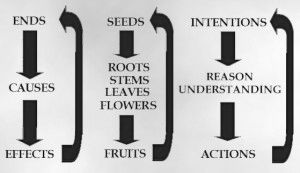|
CAUSES
 That natural things represent spiritual things, and that they correspond, may also be known from the fact that what is natural cannot possibly come forth except from a cause prior to itself. Its cause is from what is spiritual; and there is nothing natural which does not thence derive its cause. Natural forms are effects; nor can they appear as causes, still less as causes of causes, or beginnings; but they receive their forms according to the use in the place where they are; and yet the forms of the effects represent the things which are of the causes; and indeed these latter things represent those which are of the beginnings. Thus all natural things represent those which are of the spiritual things to which they correspond; and in fact the spiritual things also represent those which are of the celestial things from which they are. [AC2991] That natural things represent spiritual things, and that they correspond, may also be known from the fact that what is natural cannot possibly come forth except from a cause prior to itself. Its cause is from what is spiritual; and there is nothing natural which does not thence derive its cause. Natural forms are effects; nor can they appear as causes, still less as causes of causes, or beginnings; but they receive their forms according to the use in the place where they are; and yet the forms of the effects represent the things which are of the causes; and indeed these latter things represent those which are of the beginnings. Thus all natural things represent those which are of the spiritual things to which they correspond; and in fact the spiritual things also represent those which are of the celestial things from which they are. [AC2991]
The correspondence of the will and understanding with the heart and lungs cannot be abstractly proved, that is, by mere reasonings, but it may be proved by effects. It is much the same as it is with the causes of things which can be seen rationally, yet not clearly except by means of effects; for causes are in effects, and by means of effects make themselves visible; and until causes are thus made visible, the mind is not assured respecting them. In what follows, the effects of this correspondence will be described. But lest any one should fall into ideas of this correspondence imbibed from hypotheses about the soul, let him first read over carefully the propositions in the preceding chapter, as follows: Love and wisdom, and the will and understanding therefrom, make the very life of man (n. 363, 365). The life of man is in first principles in the brains, and in derivatives in the body (n. 365). Such as life is in first principles, such it is in the whole and in every part (n. 366). By means of these first principles life is in the whole from every part, and in every part from the whole (n. 367). Such as the love is, such is the wisdom, consequently such is the man (n. 368). [DLW375]
Ends are in the first degree, causes in the second, and effects in the third.
 Who does not see that the end is not the cause, but that it produces the cause, and that the cause is not the effect, but that it produces the effect; consequently that they are three distinct things which follow in order? The end with man is the love of his will, for what a man loves, this he proposes to himself and intends; the cause with him is the reason of his understanding, for by means of it the end seeks for mediate or efficient causes; and the effect is the operation of the body from them and according to them. Thus there are three things in man, which follow each other in order, in like manner as the degrees of altitude follow each other. When these three things appear in act, then the end is inwardly in the cause, and the end through the cause is in the effect, wherefore the three coexist in the effect. On this account it is said in the Word, that everyone shall be judged according to his works; for the end, or the love of his will, and the cause, or the reason of his understanding, are together in the effects, which are the works of his body; thus the quality of the whole man is in them. Who does not see that the end is not the cause, but that it produces the cause, and that the cause is not the effect, but that it produces the effect; consequently that they are three distinct things which follow in order? The end with man is the love of his will, for what a man loves, this he proposes to himself and intends; the cause with him is the reason of his understanding, for by means of it the end seeks for mediate or efficient causes; and the effect is the operation of the body from them and according to them. Thus there are three things in man, which follow each other in order, in like manner as the degrees of altitude follow each other. When these three things appear in act, then the end is inwardly in the cause, and the end through the cause is in the effect, wherefore the three coexist in the effect. On this account it is said in the Word, that everyone shall be judged according to his works; for the end, or the love of his will, and the cause, or the reason of his understanding, are together in the effects, which are the works of his body; thus the quality of the whole man is in them.
They who do not know these things, and do not thus distinguish the objects of reason, cannot avoid terminating the ideas of their thought in the atoms of Epicurus, the monads of Leibnitz, or in the simple substances of Wolff, and thus they close up their understandings as with a bolt, so that they cannot even think from reason concerning spiritual influx, because they cannot think concerning any progression; for the author says concerning his simple substance, that if it is divided it falls into nothing. Thus the understanding stands still in its first light, which is merely from the senses of the body, and does not advance a step further. Hence it is not known but that the spiritual is a subtile natural, and that beasts have a rational as well as men, and that the son is a breath of wind such as is breathed forth from the breast when a person dies; besides many things which are not of light but of thick darkness. Since all things in the spiritual world and all things in the natural world proceed according to these degrees, as was shown in the preceding article, it is evident that intelligence properly consists in knowing and extinguishing them, and seeing them in their order. By means of these degrees, also, every man is known as to his quality, when his love is known; for, as was said above, the end which is of the will, and the causes which are of the understanding, and the effects which are of the body, follow from his love, as a tree from its seed, and as fruit from the tree. There are three kinds of loves, the love of heaven, the love of the world, and the love of self; the love of heaven is spiritual, the love of the world is material, and the love of self is corporeal. When the love is spiritual, all the things which follow from it, as forms from their essence, derive their spiritual nature; similarly if the principal love is the love of the world or of wealth, and thus is material, all the things which follow from it, as derivatives from their principle derive their material nature; likewise if the principal love is the love of self, or of eminence above all others, and thus is corporeal, all the things which follow from it derive their corporeal nature. The reason is, because the man who is in this love regards himself alone, and thus immerses the thoughts of his mind in his body. Wherefore, as was just now said, he who knows the ruling love of anyone, and at the same time the progression of ends to causes and of causes to effects, which three things follow in order according to the degrees of altitude, knows the whole man. Thus the angels of heaven know everyone with whom they speak; they perceive his love from the tone of his speech; and they see his image from his face, and his character from the gestures of his body. [ISB17]
Author: EMANUEL SWEDENBORG (1688-1772)
|
|